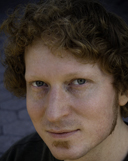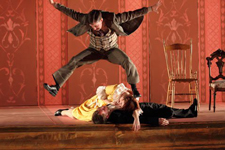Where Beckett Meets Chekhov: The Connections of Literature and Theatre

I joined this wonderful English Honor Society when I was in grad school. Before that, for my undergrad, I studied acting. Theatre is still very much a part of my life, and all through my studies in both realms I noticed an odd occurrence. I would just assume that words, literature, and theatre were linked in every conceivable fashion. Isn't theatre bringing words to life on (and off) stage? But, I have learned, many times this is not the case. Take my most current project, my first stint as a background actor for the Martin Scorsese film The Wolf of Wall Street. I'm an adjunct professor of Composition, and I was grading the final essays for the semester while waiting in the holding area for all the extras, right off set. I thought nothing of it, seeing several people reading from scripts and memorizing lines for other acting gigs, but many times in two days people came up to me and were amazed at the fact that I have anything to do with literature or English composition. When I tell them I have my M.F.A., they are almost always shocked to learn that it is in creative writing, not playwriting. This same thing happens on the other side. There is a monthly poetry/fiction reading I frequent in my town of Brooklyn, NY. Occasionally I will perform a monologue, and almost always I read my own words as if performing theatre. Often people are shocked and ask, "Where did you learn to read like that?" They ask if I'm an actor, but they're confused that I'm also a storyteller.

Scene from Chekhov's The Proposal
Literature and theatre are most certainly connected. They both sprang from the same seed of storytelling. In fact, the ancient oral tradition could be just as akin to theatre as it is to modern literature, perhaps even more. So why this disconnect between writers and actors? I'm not sure, but my thought is it's because of their focus on how words are expressed. In writing, the words on the page are a final product; a published book ready for an audience is an end of sorts. Of course, for the reader the book becomes new each time it is picked up, but much like a painting admired throughout the centuries, it is still the final product that new people find and enjoy (hopefully). With theatre, the published play is merely the beginning in the eyes of actors and directors. To actors, the script is dead and not fully art until it's performed. Actors are a part of the art as much as the script is, and their "readers" of this art—as opposed to readers of literature—are the audience, hearing words and seeing people alive and engaged, not reading words on a page. As an actor I understand this and agree with it, and as a writer I see the art living within the engaged reader sometimes as much as the engaged audience member. Words on a page are art within themselves, like a marvelous play by William Shakespeare, Samuel Beckett, or Tennessee Williams; this is why people teach these playwrights in standard literature classes! I also feel that words of a novel can create new art when working with an active reader's imagination. Just as words breathe new life to me as I speak them in the play I'm performing, they have a tricky way of breathing new life within me as I imagine Jay Gatsby gliding across his parties nearly undetected by his greedy guests, or Dean Moriarty sticking his head out the window traveling down the I-10 from west coast to east and back again.
I have to confess, this was supposed to be a short piece on how I use my English degree in my acting. In writing this piece, I've realized how fundamentally my understanding of English and theatre are entwined. Perhaps this is why I gravitate to the classics, like Shakespeare. But I realize this has more become a plea to see the wonderful connections between theatre and literature. The next time you're with your theatre buddies watching a play, which I surely hope you do, at least on occasion, invite them out to your next wordy event. Take them to an open mic and try to coax out a monologue; start a book club and every once in a while throw in a Lanford Wilson play, or even compare the prose of Anton Chekhov to his plays. These two art forms really do have a lot to talk about!



